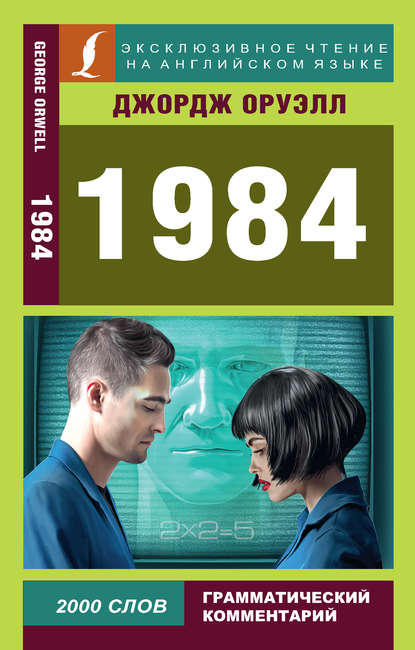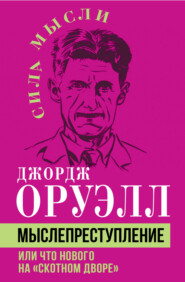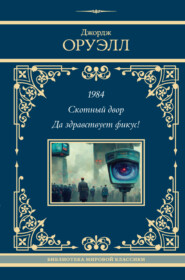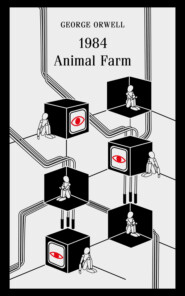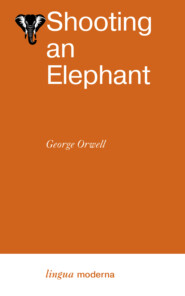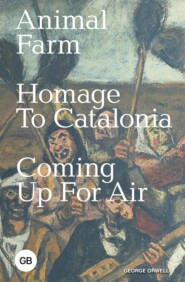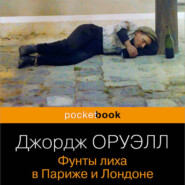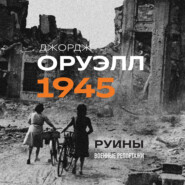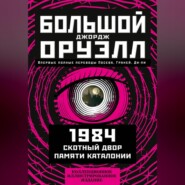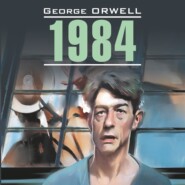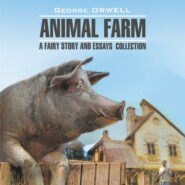По всем вопросам обращайтесь на: info@litportal.ru
(©) 2003-2025.
✖
1984
Настройки чтения
Размер шрифта
Высота строк
Поля
I understand HOW: I do not understand WHY.
He wondered, as he had many times wondered before, whether he himself was a lunatic. Perhaps a lunatic was simply a minority of one. At one time it had been a sign of madness to believe that the earth goes round the sun; today, to believe that the past is inalterable. He might be ALONE in holding that belief, and if alone, then a lunatic. But the thought of being a lunatic did not greatly trouble him: the horror was that he might also be wrong.
He picked up the children’s history book and looked at the portrait of Big Brother on the cover. The eyes gazed into his own. It was as though some huge force were pressing down upon you—something that penetrated inside your skull,
His courage seemed suddenly to stiffen of its own accord. The face of O’Brien had floated into his mind. He knew, with more certainty than before, that O’Brien was on his side. He was writing the diary for O’Brien—TO O’Brien.
The Party told you to reject the evidence of your eyes and ears. It was their most essential command. His heart sank as he thought of the enormous power positioned against him,.And yet he was in the right! They were wrong and he was right. The obvious, the silly, and the true had got to be defended. The solid world exists, its laws do not change. Stones are hard, water is wet, objects unsupported fall towards the earth’s centre. With the feeling that he was speaking to O’Brien, he wrote:
Freedom is the freedom to say that two plus two make four. If that is granted, all else follows.
Chapter 8
Winston had walked for several kilometres. This was the second time in three weeks that he had missed an evening at the Community Centre: a rash act, since you could be certain that the number of your attendances at the Centre was carefully checked. In principle a Party member had no spare time, and was never alone except in bed. It was assumed that when he was not working, eating, or sleeping he would be taking part in some kind of communal activity. But this evening as he came out of the Ministry the April air had tempted him. The sky was a warmer blue than he had seen it that year, and suddenly the long, noisy evening at the Centre had seemed intolerable. He had turned away from the bus-stop and wandered off into the labyrinth of London.
“If there is hope,” he had written in the diary, “it lies in the proles.” The words kept coming back to him. He was walking up a cobbled street of little houses. Perhaps a quarter of the windows in the street were broken and boarded up. Most of the people paid no attention to Winston. The blue overalls of the Party could not be a common sight in a street like this. Indeed, it was unwise to be here, unless you had definite business. The patrols might stop you if you happened to run into them.
He turned to the right. It was nearly twenty hours, and the drinking-shops which the proles went to (“pubs”, they called them) were full with customers.
But if there was hope, it lay in the proles. You had to cling on to that. When you put it in words it sounded reasonable: it was when you looked at the human beings passing you on the pavement that it became an act of faith. The street took a sharp turn and then ended in a flight of steps which led down into an alley. At this moment Winston remembered where he was. The alley led out into the main street, and down the next turning, not five minutes away, was the junkshop where he had bought the blank book which was now his diary.
He paused for a moment at the top of the steps. On the opposite side of the alley there was a pub. A very old man pushed open the swing door and went in. As Winston stood watching, it occurred to him that the old man, had already been middleaged when the Revolution happened. He and a few others like him were the last links to the past. In the Party itself there were not many people left whose ideas had been formed before the Revolution. The older generation had mostly been wiped out in the great purges of the fifties and sixties. Suddenly, an impulse took hold of him. He would go into the pub and question the old man. He would say to him: “Tell me about your life when you were a boy. What was it like in those days? Were things better than they are now, or were they worse?”
Hurriedly, he went down the steps and crossed the street. It was madness of course. As usual, there was no definite rule against talking to proles and going to their pubs, but it was far too unusual an action to pass unnoticed. He pushed open the door, and a hideous smell hit him in the face. As he entered the din of voices dropped to about half its volume. Behind his back he could feel everyone looking at his blue overalls. The old man whom he had followed was standing at the bar, talking to the barman.
“I arst you civil enough, didn’t I?” said the old man. “You telling me you ain’t got a pint mug in the ‘ole bleeding boozer?”
“And what in hell’s name IS a pint?” said the barman, leaning forward with the tips of his fingers on the counter.
“’Ark at ‘im! Calls ‘isself a barman and don’t know what a pint is! Why, a pint’s the ‘alf of a quart, and there’s four quarts to the gallon. ‘Ave to teach you the A, B, C next.”
“Never heard of ‘em,” said the barman shortly. “Litre and half litre—that’s all we serve. There’s the glasses on the shelf in front of you.”
“I likes a pint,” persisted the old man. “We didn’t “ave these bleeding litres when I was a young man.”
“When you were a young man we were all living in the treetops,” said the barman, with a glance at the other customers.
There was a shout of laughter, and the uneasiness caused by Winston’s entry seemed to disappear. The old man turned away, muttering to himself. Winston caught him gently by the arm.
“May I offer you a drink?” he said.
“You’re a gent,” said the man. He appeared not to have noticed Winston’s blue overalls. “Pint!” he added to the barman. “Pint of wallop.”
The barman poured two half-litres of dark-brown beer into thick glasses. Beer was the only drink you could get in prole pubs. There was a table under the window where he and the old man could talk without fear of being overheard.
“’E could ‘a drawed me off a pint,” grumbled the old man as he settled down behind a glass. “A ‘alf litre ain’t enough. It don’t satisfy. And a ‘ole litre’s too much. It starts my bladder running. Let alone the price.”
“You must have seen great changes since you were a young man,” said Winston.
“The beer was better,” said the man. “And cheaper! When I was a young man, mild beer—wallop we used to call it—‘as fourpence a pint. That was before the war, of course.”
“Which war was that?” said Winston.
“It’s all wars,” said the old man vaguely. He took up his glass. “‘Ere’s wishing you the very best of ’ealth!”
He drank the beer. Winston went to the bar and came back with two more half-litres. The old man appeared to have forgotten his prejudice against drinking a full litre.
“You are very much older than I am,” said Winston. “You must have been a grown man before I was born. You can remember what it was like in the old days, before the Revolution. People of my age don’t really know anything about those times. We can only read about them in books, and what it says in the books may not be true. I should like your opinion on that. The history books say that life before the Revolution was completely different from what it is now. There was the most terrible oppression, injustice, poverty. What I really wanted to know was this: do you feel that you have more freedom now than you had in those days? Are you treated more like a human being? In the old days, the rich people, the people at the top—”
“The ‘Ouse of Lords,” put in the old man reminiscently.
“The House of Lords, if you like. What I am asking is, were these people able to treat you as an inferior, simply because they were rich and you were poor? Is it a fact, for instance, that you had to call them “Sir” and take off your cap when you passed them?”
The old man appeared to think deeply. He drank off about a quarter of his beer before answering.
“Yes,” he said. “They liked you to touch your cap to ‘em. It showed respect, like. I didn’t agree with it, myself, but I done it often enough. Had to, as you might say.”
“And was it usual—I’m only quoting what I’ve read in history books—was it usual for these people and their servants to push you off the pavement into the gutter?”
“One of ‘em pushed me once,” said the old man. “I recollect it as if it was yesterday. It was Boat Race night and I bumps into a young bloke on Shaftesbury Avenue. Quite a gent, ‘e was—dress shirt, top ‘at, black overcoat. ‘E was kind of zig-zagging across the pavement, and I bumps into ‘im accidental-like. ‘E says, ‘Why can’t you look where you’re going?’ ‘e says. I say, ‘Ju think you’ve bought the pavement?’ ‘E says, ‘I’ll twist your bloody ‘ead off if you get fresh with me.’ I says, ‘You’re drunk. I’ll give you in charge in ‘alf a minute,’ I says. An’ if you’ll believe me, ‘e puts ‘is ‘and on my chest and gives me a shove as pretty near sent me under the wheels of a bus. Well, I was young in them days, only—”
A sense of helplessness took hold of Winston. The old man’s memory was nothing but a rubbish-heap of details.
“Perhaps I have not made myself clear,” he said. “What I’m trying to say is this. You have been alive a very long time; you lived half your life before the Revolution. In 1925, for instance, you were already grown up. Would you say from what you can remember, that life in 1925 was better than it is now, or worse? If you could choose, would you prefer to live then or now?”
The old man finished up his beer, more slowly than before. When he spoke it was with a tolerant philosophical air.
“I know what you expect me to say,” he said. “You expect me to say as I’d sooner be young again. Most people’d say they’d sooner be young, if you arst’ ‘em. You got your ‘ealth and strength when you’re young. When you get to my time of life you ain’t never well. You ain’t got the same worries.”
Winston sat back against the window-sill. It was no use going on. He was about to buy some more beer when the old man suddenly got up and went into the stinking urinal at the side of the room. The extra half-litre was already working on him. Winston sat for a minute or two, and hardly noticed when his feet carried him out into the street again.
When he looked up, he was in a narrow street, with a few dark little shops. Of course! He was standing outside the junk-shop where he had bought the diary.
Fear went through him. He had sworn never to come near the place again. And yet his feet had brought him back here of their own accord.
The owner had just lighted a hanging oil lamp. He was a man of perhaps sixty, with a long, benevolent nose, and mild eyes distorted by thick spectacles. His hair was almost white, but his eyebrows were bushy and still black. He was wearing an aged jacket of black velvet. His voice was soft.
“I recognized you on the pavement,” he said immediately. “You’re the gentleman that bought the young lady’s keepsake album. That was a beautiful bit of paper, that was.” He looked at Winston over the top of his spectacles. “Is there anything I can do for you? Or did you just want to look round?”
“I was passing,” said Winston. “I just looked in. I don’t want anything in particular.”
“It’s just as well,” said the other. “Between you and me, the antique trade’s just about finished. No demand any longer, and no stock either.”
The tiny interior of the shop was uncomfortably full, but there was almost nothing in it of the value. The floorspace was very restricted, because all round the walls were stacked picture-frames. In the window there were trays of nuts and bolts, worn-out chisels, penknives with broken blades, watches that did not even pretend to be working, and other rubbish. Then Winston’s eye was caught by a round, smooth thing that gleamed softly in the lamplight, and he picked it up.
It was a heavy lump of glass, curved on one side, flat on the other, making almost a hemisphere. At the heart of it was a strange, pink object that recalled a rose or a sea anemone.
“What is it?” said Winston, fascinated.





